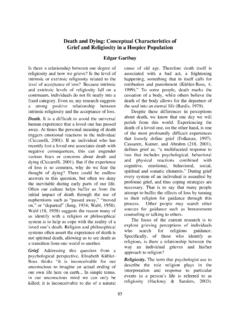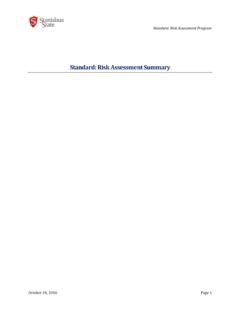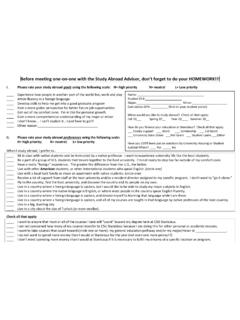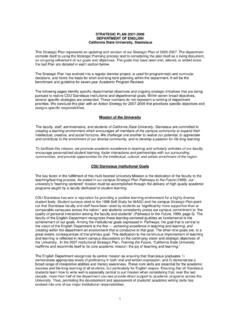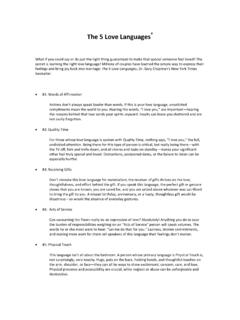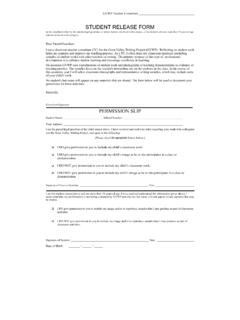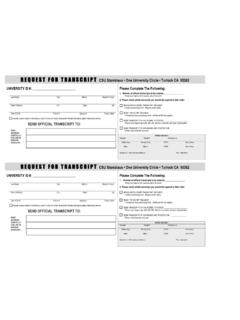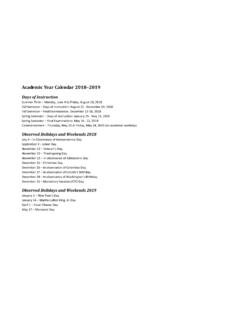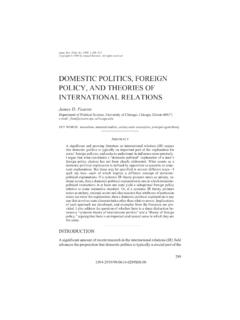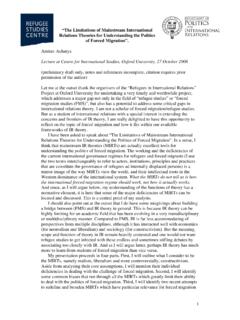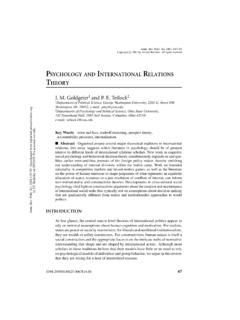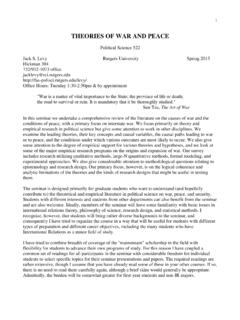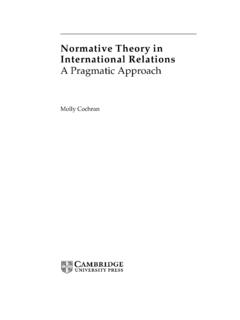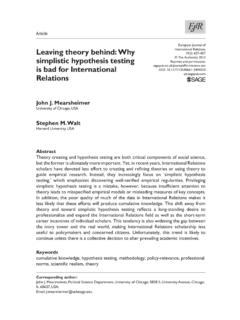Transcription of uiz - California State University Stanislaus
1 Feminis t Th eor y and In t erna tional Rela tions: Th e Feminis t Challenge t o Realism and Liberalism Tricia Ruiz Since the end of the Cold War and the increased interdependence resulting from the globalization process, the field of international relations has faced major challenges to its core theoretical structure. It no longer revolves solely around the realist issues of war and security, but rather, international relations has broadened to include traditionally liberal concerns, such as the international political economy, socioeconomic development, human rights, non- State actors, and civil society.
2 Apart from the two main theories of realism and liberalism, the feminist theory brings new perspectives to the international relations table. This paper will consider the feminist theory in international relations , and what can be learned from this perspective. The first section will provide some key terms and main ideas in feminist theory , and will share its viewpoint with respect to world politics. The second section will present feminist critiques of existing international relations theory , and discuss how feminist theory explains the shortcomings of realism and liberalism.
3 The paper will conclude by assessing the feminist theory in relation to the frameworks of realist and liberal theories . This section will ask: Does feminist theory have a separate argument strong enough to transform the field of international relations ? Or if it is more a subset of other theories , can it still enhance and expand the discourse of international relations in significant ways? Prior to presenting the main ideas in feminist international relations theory , we need to define two key terms -- gender and patriarchy that are central to feminist discussion.
4 Gender is not a synonym for the term sex , or the biological difference between men and women, but instead refers to the complex social construction of men s and women s [and] relation to each other. Fundamental in the discourse on gender is the notion of power and power dynamics between genders. 1 Simply put, using the concept of gender, feminists analyze relations of power involving men and women, how that power is exerted, and how that interaction has been habitually, historically, and socially implemented over time (though not as a result of inherent or biological differences of either sex).
5 Lorraine Code helps us to understand the second term critical to feminist theory , patriarchy , which she defines as a system in which females are subordinate to men, in terms of power and status, and which is based on the belief that it is right and proper for men to command and women to obey. Patriarchal roots, she notes, can be found as far back as Aristotle s assertion that women s biological inferiority is akin to her reasoning capabilities; later such systems became perpetuated by the Judaeo-Christian world as under most other world religions.
6 2 How do feminists use gender and patriarchy to describe the field of international relations (IR)? Overall, feminist theory says that most of the key players in IR, such as diplomats, policymakers, heads of government, and academic professionals, have been, and still are, males who come from patriarchal social and political backgrounds. Thus, discussions within IR remain largely constrained by those who lack consideration of women s roles in world politics (because they have not been trained to value and include the perspective of women).
7 Should IR perpetuate the exclusion of women from its 1 Diana Thorburn, Feminism Meets international relations . SAIS Review v20, i2 (Summer-Fall 2000): 2. Expanded Academic ASAP, Infotrac (15 November 2003). 2 Lorraine Code. Encyclopedia of Feminist theories . (London; New York: Routledge, 2002), PAGE, Netlibrary/eBook Collection (29 November 2003). discipline, along with their potential contributions and additional viewpoints, IR will remain a prime example of patriarchy, in both its practice and accomplishments.
8 Indeed, IR is frequently referred to as the last bastion of the social sciences, 3 indicating how rigid it remains in reconsidering itself through the gender lens . feminists also apply the terms gender and patriarchy when analyzing how situations have been shaped to exclude women from the international political arena. For example, Eric M. Blanchard refers to a catch-22 situation, in which a candidate seeking political office will highly depend on past military service as qualification for the position, putting women at a disadvantage since they generally have less military experience.
9 This significantly limits a woman s chances to attain a national government position directly involved with international issues of defense and From this example alone, we can understand how the areas of domestic politics, the military, and even the topic of education (which is directly related to this example), are issues with respect to which feminists would argue that gender and patriarchy do not allow women equal access to power positions in world politics. As with many theories , feminist theory reflects a wide range of perspectives generating many internal debates concerning how it should be represented.
10 As Diana Thorburn notes, there can never be a truly singular voice of feminist foreign policy simply because of the diversity of views within feminism itself. 5 However, a brief look at some relevant facets of the discipline can be seen through Lorraine Codes summary of two salient 3 Diana Thorburn. Feminism Meets international relations . SAIS Review v20, i2 (Summer-Fall 2000): 3. Expanded Academic ASAP, Infotrac (15 November 2003). 4 Eric M. Blanchard. Gender, international relations , and the Development of Feminist Security theory .
